Migration Law Assignment: Review Mechanisms and Case Analysis
VerifiedAdded on 2023/01/16
|9
|2264
|100
Homework Assignment
AI Summary
This document provides a comprehensive solution to a Migration Law assignment focusing on migration review mechanisms. The assignment analyzes the implications of the Beni v Minister for Immigration and Border Protection case, specifically addressing the time limits for appealing visa cancellations and the powers of the Federal Circuit Court and Administrative Appeals Tribunal. It explores various scenarios involving bridging visas, including the impact of visa cancellations on existing applications and the types of bridging visas held. The assignment also examines the avenues for review available to visa holders, including applications to the Minister for public interest considerations. The solution incorporates relevant legislation, including the Migration Act 1958 and the Migration Regulations 1994, and provides detailed answers to several legal questions, making it a valuable resource for students studying migration law.
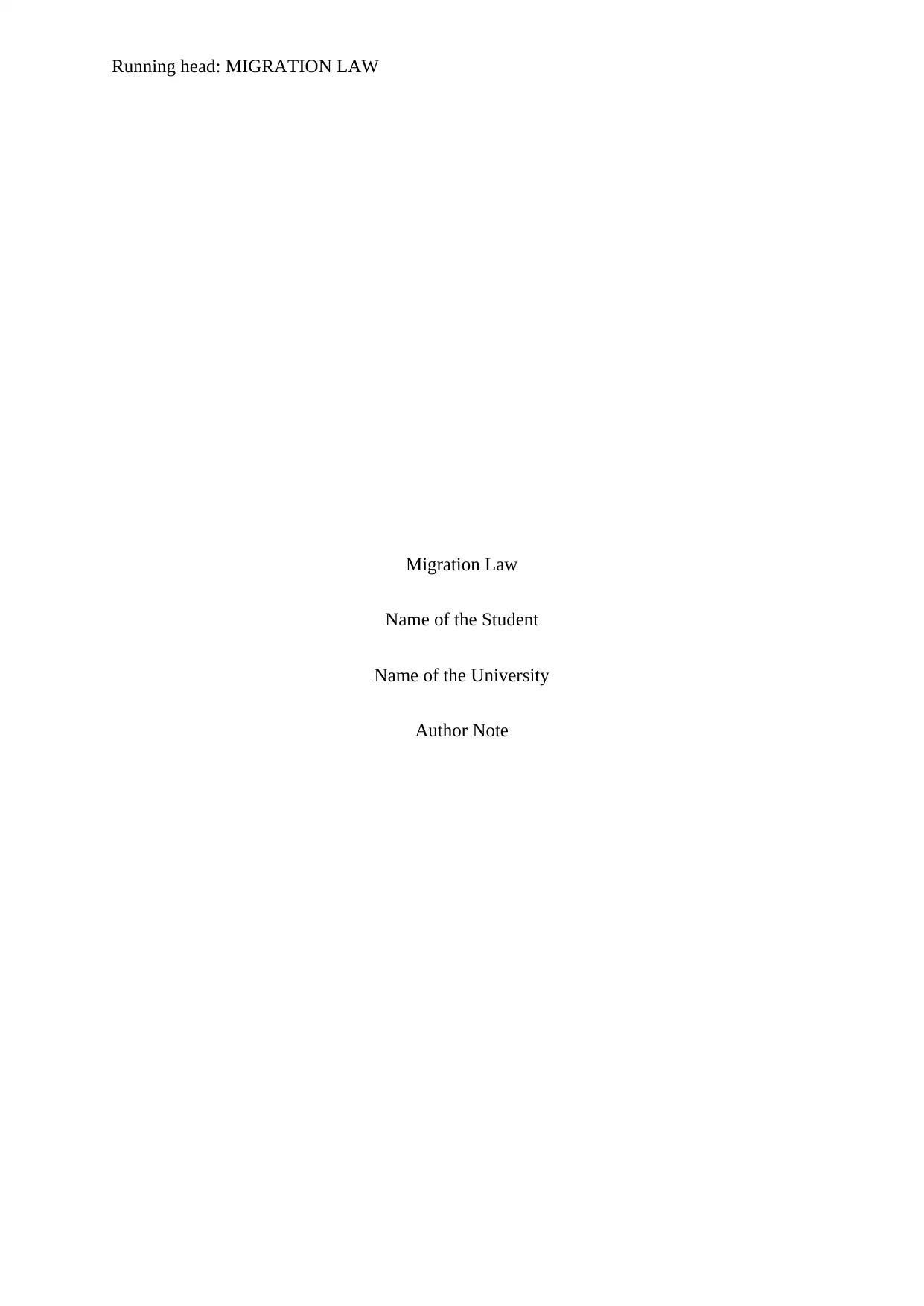
Running head: MIGRATION LAW
Migration Law
Name of the Student
Name of the University
Author Note
Migration Law
Name of the Student
Name of the University
Author Note
Paraphrase This Document
Need a fresh take? Get an instant paraphrase of this document with our AI Paraphraser
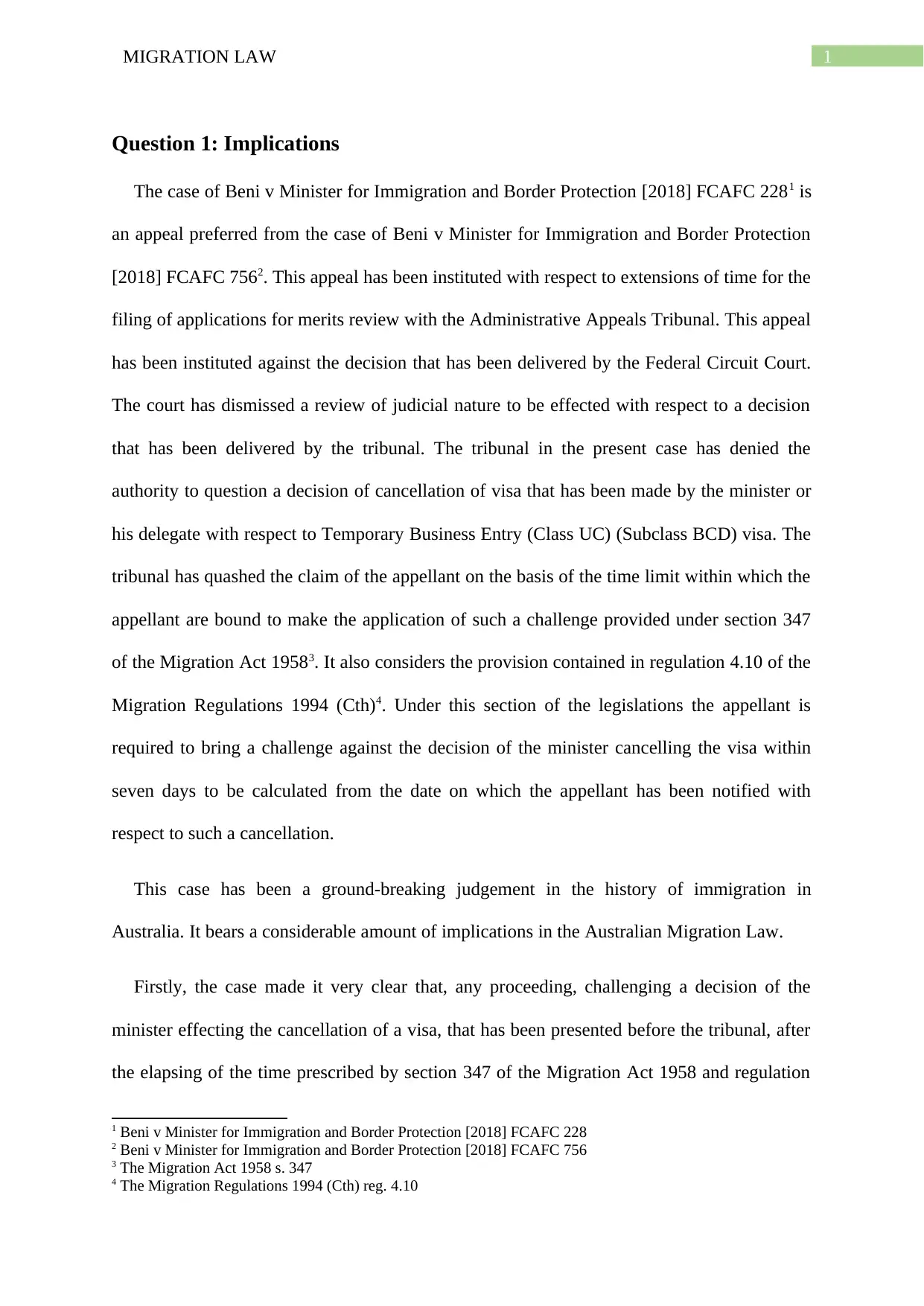
1MIGRATION LAW
Question 1: Implications
The case of Beni v Minister for Immigration and Border Protection [2018] FCAFC 2281 is
an appeal preferred from the case of Beni v Minister for Immigration and Border Protection
[2018] FCAFC 7562. This appeal has been instituted with respect to extensions of time for the
filing of applications for merits review with the Administrative Appeals Tribunal. This appeal
has been instituted against the decision that has been delivered by the Federal Circuit Court.
The court has dismissed a review of judicial nature to be effected with respect to a decision
that has been delivered by the tribunal. The tribunal in the present case has denied the
authority to question a decision of cancellation of visa that has been made by the minister or
his delegate with respect to Temporary Business Entry (Class UC) (Subclass BCD) visa. The
tribunal has quashed the claim of the appellant on the basis of the time limit within which the
appellant are bound to make the application of such a challenge provided under section 347
of the Migration Act 19583. It also considers the provision contained in regulation 4.10 of the
Migration Regulations 1994 (Cth)4. Under this section of the legislations the appellant is
required to bring a challenge against the decision of the minister cancelling the visa within
seven days to be calculated from the date on which the appellant has been notified with
respect to such a cancellation.
This case has been a ground-breaking judgement in the history of immigration in
Australia. It bears a considerable amount of implications in the Australian Migration Law.
Firstly, the case made it very clear that, any proceeding, challenging a decision of the
minister effecting the cancellation of a visa, that has been presented before the tribunal, after
the elapsing of the time prescribed by section 347 of the Migration Act 1958 and regulation
1 Beni v Minister for Immigration and Border Protection [2018] FCAFC 228
2 Beni v Minister for Immigration and Border Protection [2018] FCAFC 756
3 The Migration Act 1958 s. 347
4 The Migration Regulations 1994 (Cth) reg. 4.10
Question 1: Implications
The case of Beni v Minister for Immigration and Border Protection [2018] FCAFC 2281 is
an appeal preferred from the case of Beni v Minister for Immigration and Border Protection
[2018] FCAFC 7562. This appeal has been instituted with respect to extensions of time for the
filing of applications for merits review with the Administrative Appeals Tribunal. This appeal
has been instituted against the decision that has been delivered by the Federal Circuit Court.
The court has dismissed a review of judicial nature to be effected with respect to a decision
that has been delivered by the tribunal. The tribunal in the present case has denied the
authority to question a decision of cancellation of visa that has been made by the minister or
his delegate with respect to Temporary Business Entry (Class UC) (Subclass BCD) visa. The
tribunal has quashed the claim of the appellant on the basis of the time limit within which the
appellant are bound to make the application of such a challenge provided under section 347
of the Migration Act 19583. It also considers the provision contained in regulation 4.10 of the
Migration Regulations 1994 (Cth)4. Under this section of the legislations the appellant is
required to bring a challenge against the decision of the minister cancelling the visa within
seven days to be calculated from the date on which the appellant has been notified with
respect to such a cancellation.
This case has been a ground-breaking judgement in the history of immigration in
Australia. It bears a considerable amount of implications in the Australian Migration Law.
Firstly, the case made it very clear that, any proceeding, challenging a decision of the
minister effecting the cancellation of a visa, that has been presented before the tribunal, after
the elapsing of the time prescribed by section 347 of the Migration Act 1958 and regulation
1 Beni v Minister for Immigration and Border Protection [2018] FCAFC 228
2 Beni v Minister for Immigration and Border Protection [2018] FCAFC 756
3 The Migration Act 1958 s. 347
4 The Migration Regulations 1994 (Cth) reg. 4.10
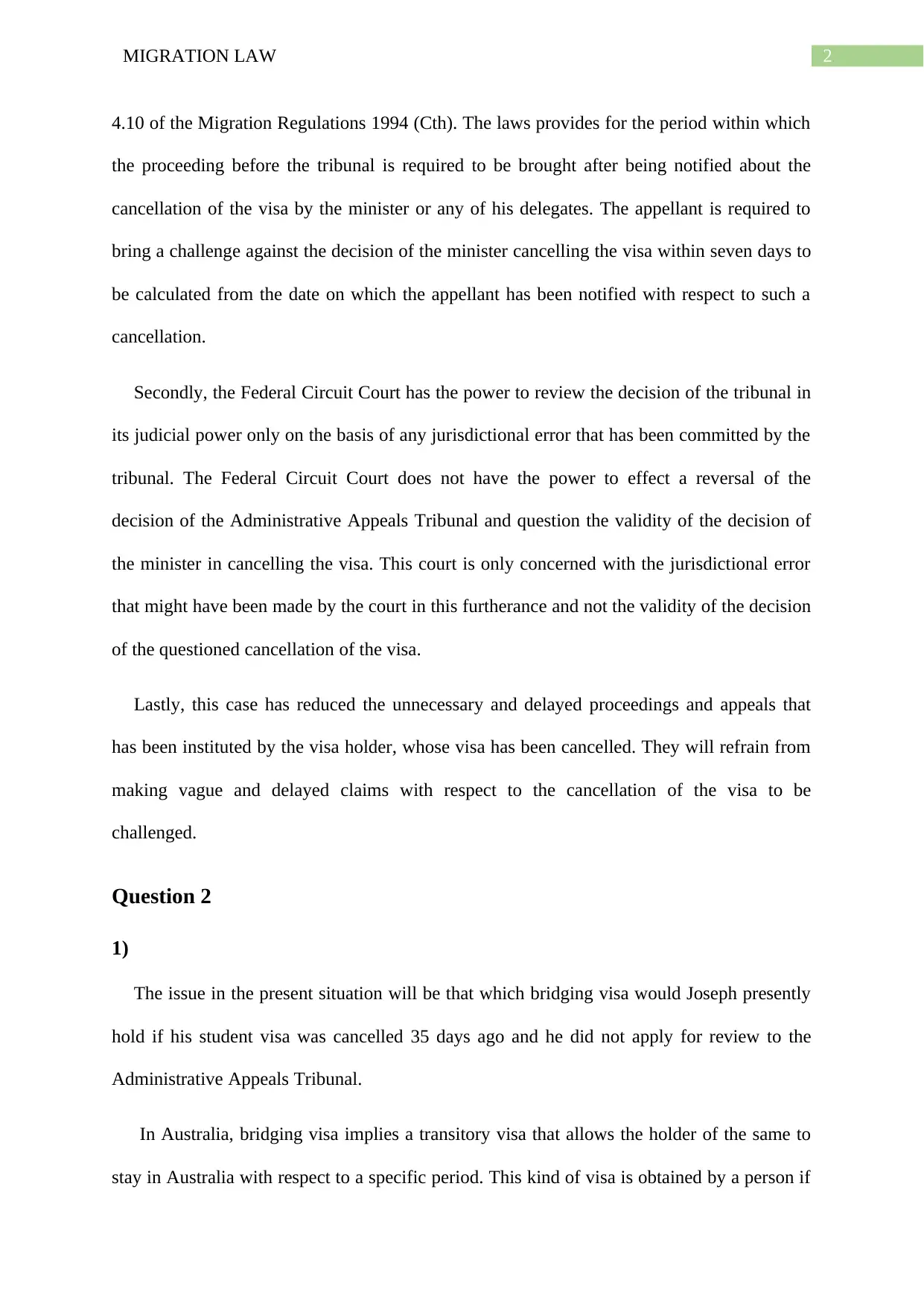
2MIGRATION LAW
4.10 of the Migration Regulations 1994 (Cth). The laws provides for the period within which
the proceeding before the tribunal is required to be brought after being notified about the
cancellation of the visa by the minister or any of his delegates. The appellant is required to
bring a challenge against the decision of the minister cancelling the visa within seven days to
be calculated from the date on which the appellant has been notified with respect to such a
cancellation.
Secondly, the Federal Circuit Court has the power to review the decision of the tribunal in
its judicial power only on the basis of any jurisdictional error that has been committed by the
tribunal. The Federal Circuit Court does not have the power to effect a reversal of the
decision of the Administrative Appeals Tribunal and question the validity of the decision of
the minister in cancelling the visa. This court is only concerned with the jurisdictional error
that might have been made by the court in this furtherance and not the validity of the decision
of the questioned cancellation of the visa.
Lastly, this case has reduced the unnecessary and delayed proceedings and appeals that
has been instituted by the visa holder, whose visa has been cancelled. They will refrain from
making vague and delayed claims with respect to the cancellation of the visa to be
challenged.
Question 2
1)
The issue in the present situation will be that which bridging visa would Joseph presently
hold if his student visa was cancelled 35 days ago and he did not apply for review to the
Administrative Appeals Tribunal.
In Australia, bridging visa implies a transitory visa that allows the holder of the same to
stay in Australia with respect to a specific period. This kind of visa is obtained by a person if
4.10 of the Migration Regulations 1994 (Cth). The laws provides for the period within which
the proceeding before the tribunal is required to be brought after being notified about the
cancellation of the visa by the minister or any of his delegates. The appellant is required to
bring a challenge against the decision of the minister cancelling the visa within seven days to
be calculated from the date on which the appellant has been notified with respect to such a
cancellation.
Secondly, the Federal Circuit Court has the power to review the decision of the tribunal in
its judicial power only on the basis of any jurisdictional error that has been committed by the
tribunal. The Federal Circuit Court does not have the power to effect a reversal of the
decision of the Administrative Appeals Tribunal and question the validity of the decision of
the minister in cancelling the visa. This court is only concerned with the jurisdictional error
that might have been made by the court in this furtherance and not the validity of the decision
of the questioned cancellation of the visa.
Lastly, this case has reduced the unnecessary and delayed proceedings and appeals that
has been instituted by the visa holder, whose visa has been cancelled. They will refrain from
making vague and delayed claims with respect to the cancellation of the visa to be
challenged.
Question 2
1)
The issue in the present situation will be that which bridging visa would Joseph presently
hold if his student visa was cancelled 35 days ago and he did not apply for review to the
Administrative Appeals Tribunal.
In Australia, bridging visa implies a transitory visa that allows the holder of the same to
stay in Australia with respect to a specific period. This kind of visa is obtained by a person if
⊘ This is a preview!⊘
Do you want full access?
Subscribe today to unlock all pages.

Trusted by 1+ million students worldwide
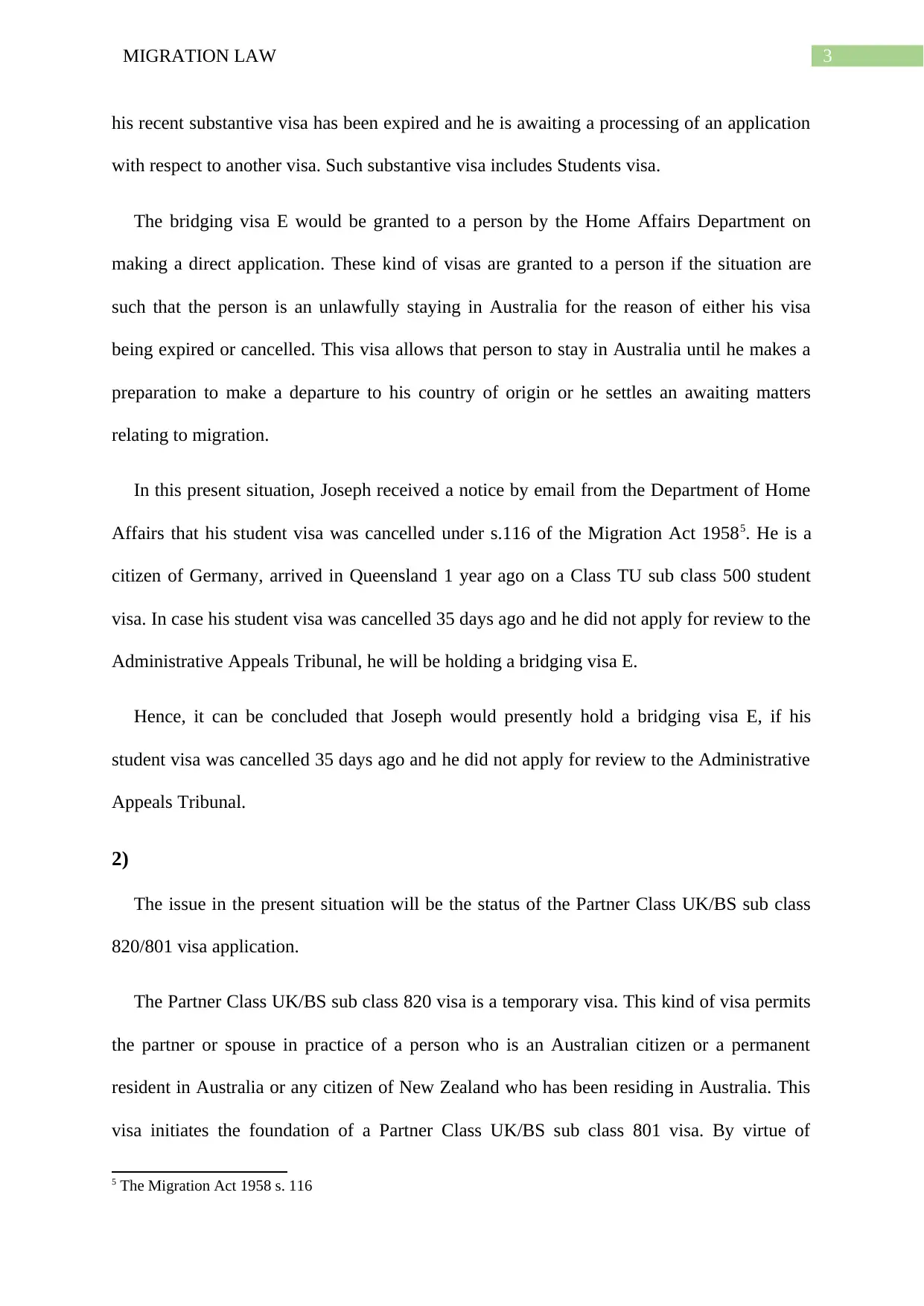
3MIGRATION LAW
his recent substantive visa has been expired and he is awaiting a processing of an application
with respect to another visa. Such substantive visa includes Students visa.
The bridging visa E would be granted to a person by the Home Affairs Department on
making a direct application. These kind of visas are granted to a person if the situation are
such that the person is an unlawfully staying in Australia for the reason of either his visa
being expired or cancelled. This visa allows that person to stay in Australia until he makes a
preparation to make a departure to his country of origin or he settles an awaiting matters
relating to migration.
In this present situation, Joseph received a notice by email from the Department of Home
Affairs that his student visa was cancelled under s.116 of the Migration Act 19585. He is a
citizen of Germany, arrived in Queensland 1 year ago on a Class TU sub class 500 student
visa. In case his student visa was cancelled 35 days ago and he did not apply for review to the
Administrative Appeals Tribunal, he will be holding a bridging visa E.
Hence, it can be concluded that Joseph would presently hold a bridging visa E, if his
student visa was cancelled 35 days ago and he did not apply for review to the Administrative
Appeals Tribunal.
2)
The issue in the present situation will be the status of the Partner Class UK/BS sub class
820/801 visa application.
The Partner Class UK/BS sub class 820 visa is a temporary visa. This kind of visa permits
the partner or spouse in practice of a person who is an Australian citizen or a permanent
resident in Australia or any citizen of New Zealand who has been residing in Australia. This
visa initiates the foundation of a Partner Class UK/BS sub class 801 visa. By virtue of
5 The Migration Act 1958 s. 116
his recent substantive visa has been expired and he is awaiting a processing of an application
with respect to another visa. Such substantive visa includes Students visa.
The bridging visa E would be granted to a person by the Home Affairs Department on
making a direct application. These kind of visas are granted to a person if the situation are
such that the person is an unlawfully staying in Australia for the reason of either his visa
being expired or cancelled. This visa allows that person to stay in Australia until he makes a
preparation to make a departure to his country of origin or he settles an awaiting matters
relating to migration.
In this present situation, Joseph received a notice by email from the Department of Home
Affairs that his student visa was cancelled under s.116 of the Migration Act 19585. He is a
citizen of Germany, arrived in Queensland 1 year ago on a Class TU sub class 500 student
visa. In case his student visa was cancelled 35 days ago and he did not apply for review to the
Administrative Appeals Tribunal, he will be holding a bridging visa E.
Hence, it can be concluded that Joseph would presently hold a bridging visa E, if his
student visa was cancelled 35 days ago and he did not apply for review to the Administrative
Appeals Tribunal.
2)
The issue in the present situation will be the status of the Partner Class UK/BS sub class
820/801 visa application.
The Partner Class UK/BS sub class 820 visa is a temporary visa. This kind of visa permits
the partner or spouse in practice of a person who is an Australian citizen or a permanent
resident in Australia or any citizen of New Zealand who has been residing in Australia. This
visa initiates the foundation of a Partner Class UK/BS sub class 801 visa. By virtue of
5 The Migration Act 1958 s. 116
Paraphrase This Document
Need a fresh take? Get an instant paraphrase of this document with our AI Paraphraser
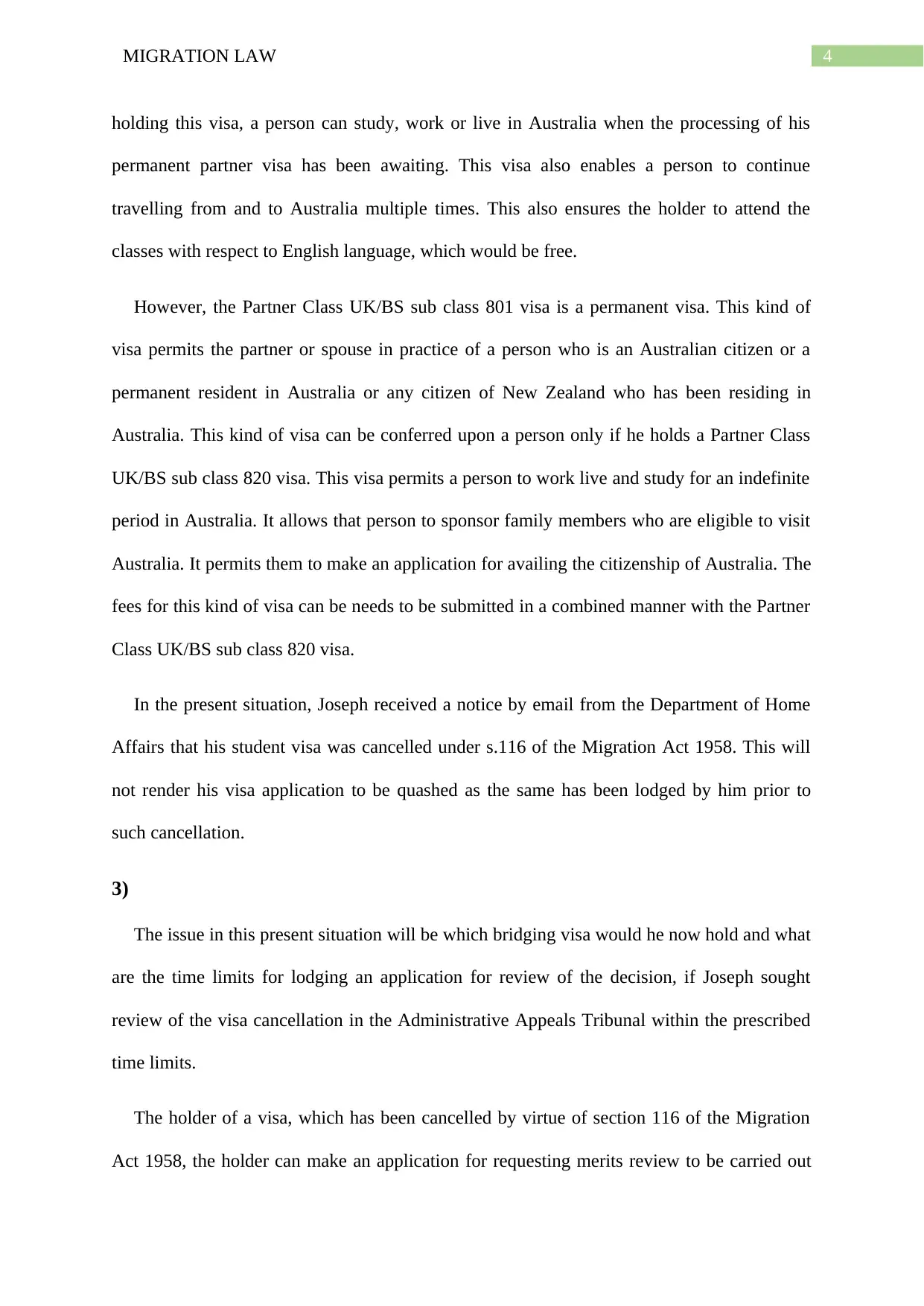
4MIGRATION LAW
holding this visa, a person can study, work or live in Australia when the processing of his
permanent partner visa has been awaiting. This visa also enables a person to continue
travelling from and to Australia multiple times. This also ensures the holder to attend the
classes with respect to English language, which would be free.
However, the Partner Class UK/BS sub class 801 visa is a permanent visa. This kind of
visa permits the partner or spouse in practice of a person who is an Australian citizen or a
permanent resident in Australia or any citizen of New Zealand who has been residing in
Australia. This kind of visa can be conferred upon a person only if he holds a Partner Class
UK/BS sub class 820 visa. This visa permits a person to work live and study for an indefinite
period in Australia. It allows that person to sponsor family members who are eligible to visit
Australia. It permits them to make an application for availing the citizenship of Australia. The
fees for this kind of visa can be needs to be submitted in a combined manner with the Partner
Class UK/BS sub class 820 visa.
In the present situation, Joseph received a notice by email from the Department of Home
Affairs that his student visa was cancelled under s.116 of the Migration Act 1958. This will
not render his visa application to be quashed as the same has been lodged by him prior to
such cancellation.
3)
The issue in this present situation will be which bridging visa would he now hold and what
are the time limits for lodging an application for review of the decision, if Joseph sought
review of the visa cancellation in the Administrative Appeals Tribunal within the prescribed
time limits.
The holder of a visa, which has been cancelled by virtue of section 116 of the Migration
Act 1958, the holder can make an application for requesting merits review to be carried out
holding this visa, a person can study, work or live in Australia when the processing of his
permanent partner visa has been awaiting. This visa also enables a person to continue
travelling from and to Australia multiple times. This also ensures the holder to attend the
classes with respect to English language, which would be free.
However, the Partner Class UK/BS sub class 801 visa is a permanent visa. This kind of
visa permits the partner or spouse in practice of a person who is an Australian citizen or a
permanent resident in Australia or any citizen of New Zealand who has been residing in
Australia. This kind of visa can be conferred upon a person only if he holds a Partner Class
UK/BS sub class 820 visa. This visa permits a person to work live and study for an indefinite
period in Australia. It allows that person to sponsor family members who are eligible to visit
Australia. It permits them to make an application for availing the citizenship of Australia. The
fees for this kind of visa can be needs to be submitted in a combined manner with the Partner
Class UK/BS sub class 820 visa.
In the present situation, Joseph received a notice by email from the Department of Home
Affairs that his student visa was cancelled under s.116 of the Migration Act 1958. This will
not render his visa application to be quashed as the same has been lodged by him prior to
such cancellation.
3)
The issue in this present situation will be which bridging visa would he now hold and what
are the time limits for lodging an application for review of the decision, if Joseph sought
review of the visa cancellation in the Administrative Appeals Tribunal within the prescribed
time limits.
The holder of a visa, which has been cancelled by virtue of section 116 of the Migration
Act 1958, the holder can make an application for requesting merits review to be carried out
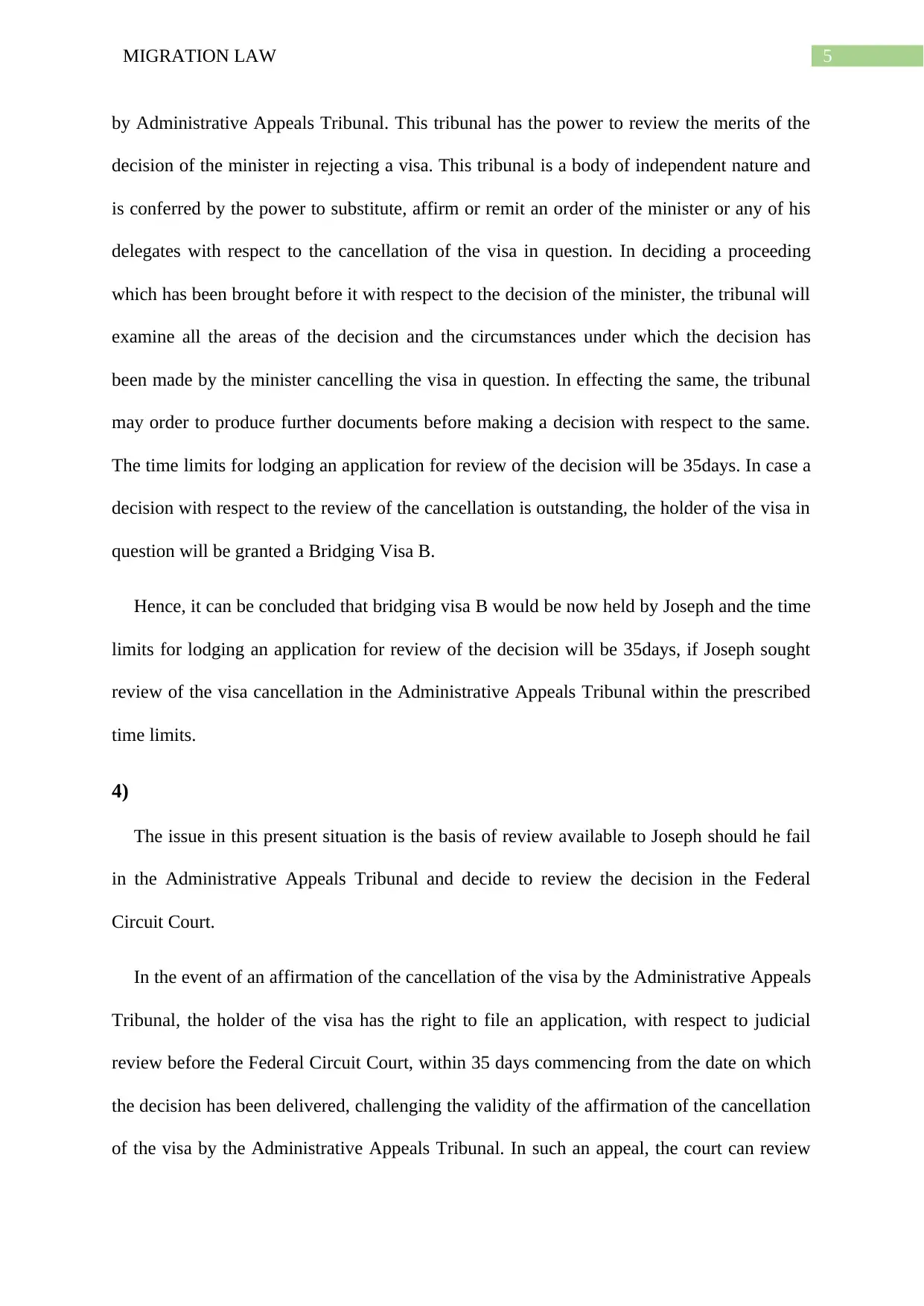
5MIGRATION LAW
by Administrative Appeals Tribunal. This tribunal has the power to review the merits of the
decision of the minister in rejecting a visa. This tribunal is a body of independent nature and
is conferred by the power to substitute, affirm or remit an order of the minister or any of his
delegates with respect to the cancellation of the visa in question. In deciding a proceeding
which has been brought before it with respect to the decision of the minister, the tribunal will
examine all the areas of the decision and the circumstances under which the decision has
been made by the minister cancelling the visa in question. In effecting the same, the tribunal
may order to produce further documents before making a decision with respect to the same.
The time limits for lodging an application for review of the decision will be 35days. In case a
decision with respect to the review of the cancellation is outstanding, the holder of the visa in
question will be granted a Bridging Visa B.
Hence, it can be concluded that bridging visa B would be now held by Joseph and the time
limits for lodging an application for review of the decision will be 35days, if Joseph sought
review of the visa cancellation in the Administrative Appeals Tribunal within the prescribed
time limits.
4)
The issue in this present situation is the basis of review available to Joseph should he fail
in the Administrative Appeals Tribunal and decide to review the decision in the Federal
Circuit Court.
In the event of an affirmation of the cancellation of the visa by the Administrative Appeals
Tribunal, the holder of the visa has the right to file an application, with respect to judicial
review before the Federal Circuit Court, within 35 days commencing from the date on which
the decision has been delivered, challenging the validity of the affirmation of the cancellation
of the visa by the Administrative Appeals Tribunal. In such an appeal, the court can review
by Administrative Appeals Tribunal. This tribunal has the power to review the merits of the
decision of the minister in rejecting a visa. This tribunal is a body of independent nature and
is conferred by the power to substitute, affirm or remit an order of the minister or any of his
delegates with respect to the cancellation of the visa in question. In deciding a proceeding
which has been brought before it with respect to the decision of the minister, the tribunal will
examine all the areas of the decision and the circumstances under which the decision has
been made by the minister cancelling the visa in question. In effecting the same, the tribunal
may order to produce further documents before making a decision with respect to the same.
The time limits for lodging an application for review of the decision will be 35days. In case a
decision with respect to the review of the cancellation is outstanding, the holder of the visa in
question will be granted a Bridging Visa B.
Hence, it can be concluded that bridging visa B would be now held by Joseph and the time
limits for lodging an application for review of the decision will be 35days, if Joseph sought
review of the visa cancellation in the Administrative Appeals Tribunal within the prescribed
time limits.
4)
The issue in this present situation is the basis of review available to Joseph should he fail
in the Administrative Appeals Tribunal and decide to review the decision in the Federal
Circuit Court.
In the event of an affirmation of the cancellation of the visa by the Administrative Appeals
Tribunal, the holder of the visa has the right to file an application, with respect to judicial
review before the Federal Circuit Court, within 35 days commencing from the date on which
the decision has been delivered, challenging the validity of the affirmation of the cancellation
of the visa by the Administrative Appeals Tribunal. In such an appeal, the court can review
⊘ This is a preview!⊘
Do you want full access?
Subscribe today to unlock all pages.

Trusted by 1+ million students worldwide
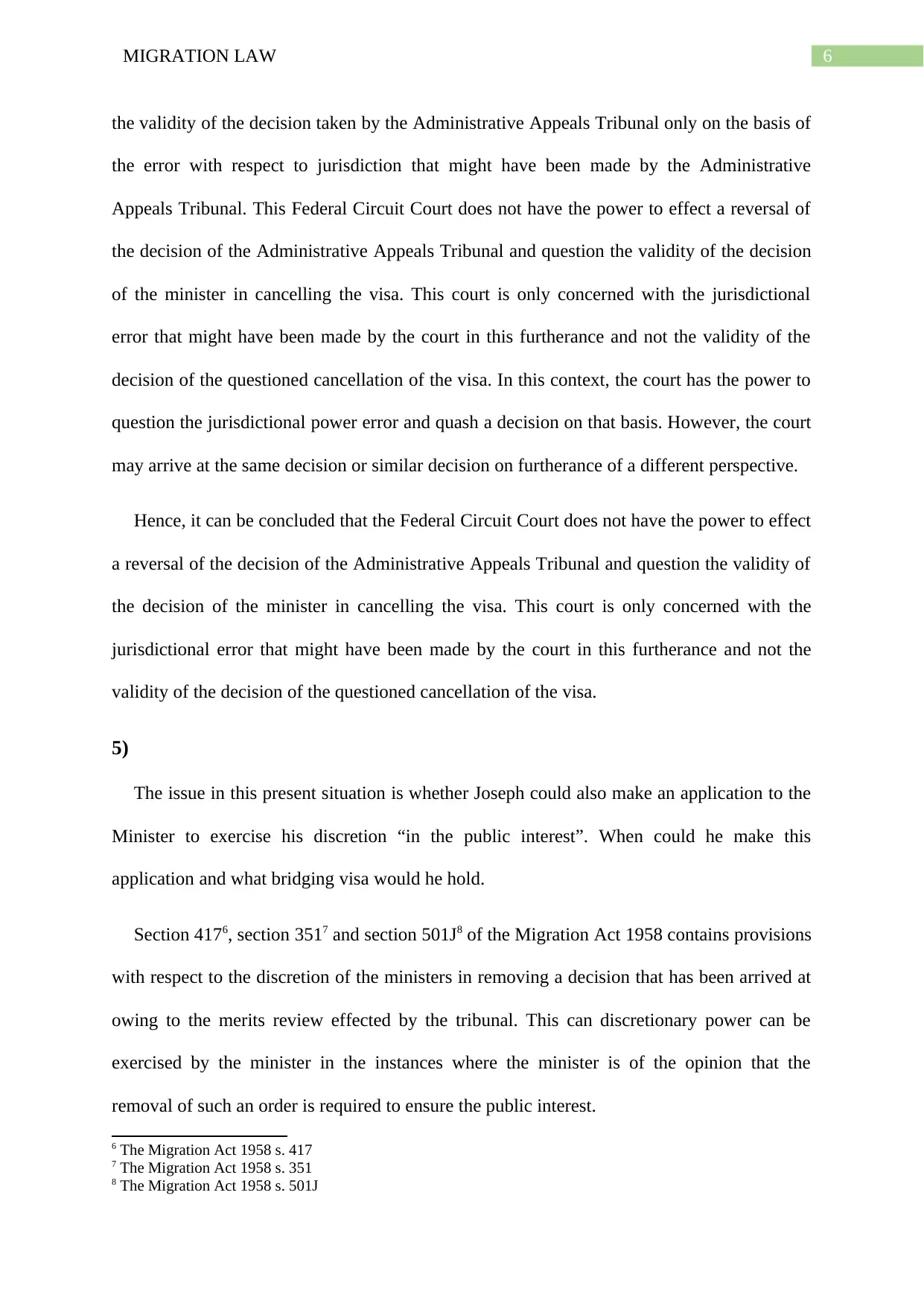
6MIGRATION LAW
the validity of the decision taken by the Administrative Appeals Tribunal only on the basis of
the error with respect to jurisdiction that might have been made by the Administrative
Appeals Tribunal. This Federal Circuit Court does not have the power to effect a reversal of
the decision of the Administrative Appeals Tribunal and question the validity of the decision
of the minister in cancelling the visa. This court is only concerned with the jurisdictional
error that might have been made by the court in this furtherance and not the validity of the
decision of the questioned cancellation of the visa. In this context, the court has the power to
question the jurisdictional power error and quash a decision on that basis. However, the court
may arrive at the same decision or similar decision on furtherance of a different perspective.
Hence, it can be concluded that the Federal Circuit Court does not have the power to effect
a reversal of the decision of the Administrative Appeals Tribunal and question the validity of
the decision of the minister in cancelling the visa. This court is only concerned with the
jurisdictional error that might have been made by the court in this furtherance and not the
validity of the decision of the questioned cancellation of the visa.
5)
The issue in this present situation is whether Joseph could also make an application to the
Minister to exercise his discretion “in the public interest”. When could he make this
application and what bridging visa would he hold.
Section 4176, section 3517 and section 501J8 of the Migration Act 1958 contains provisions
with respect to the discretion of the ministers in removing a decision that has been arrived at
owing to the merits review effected by the tribunal. This can discretionary power can be
exercised by the minister in the instances where the minister is of the opinion that the
removal of such an order is required to ensure the public interest.
6 The Migration Act 1958 s. 417
7 The Migration Act 1958 s. 351
8 The Migration Act 1958 s. 501J
the validity of the decision taken by the Administrative Appeals Tribunal only on the basis of
the error with respect to jurisdiction that might have been made by the Administrative
Appeals Tribunal. This Federal Circuit Court does not have the power to effect a reversal of
the decision of the Administrative Appeals Tribunal and question the validity of the decision
of the minister in cancelling the visa. This court is only concerned with the jurisdictional
error that might have been made by the court in this furtherance and not the validity of the
decision of the questioned cancellation of the visa. In this context, the court has the power to
question the jurisdictional power error and quash a decision on that basis. However, the court
may arrive at the same decision or similar decision on furtherance of a different perspective.
Hence, it can be concluded that the Federal Circuit Court does not have the power to effect
a reversal of the decision of the Administrative Appeals Tribunal and question the validity of
the decision of the minister in cancelling the visa. This court is only concerned with the
jurisdictional error that might have been made by the court in this furtherance and not the
validity of the decision of the questioned cancellation of the visa.
5)
The issue in this present situation is whether Joseph could also make an application to the
Minister to exercise his discretion “in the public interest”. When could he make this
application and what bridging visa would he hold.
Section 4176, section 3517 and section 501J8 of the Migration Act 1958 contains provisions
with respect to the discretion of the ministers in removing a decision that has been arrived at
owing to the merits review effected by the tribunal. This can discretionary power can be
exercised by the minister in the instances where the minister is of the opinion that the
removal of such an order is required to ensure the public interest.
6 The Migration Act 1958 s. 417
7 The Migration Act 1958 s. 351
8 The Migration Act 1958 s. 501J
Paraphrase This Document
Need a fresh take? Get an instant paraphrase of this document with our AI Paraphraser

7MIGRATION LAW
In such as case, the holder of the visa in question may hold a Bridging Visa E, Bridging
Visa D or Bridging Visa C.
In this case, Joseph can make an application to the Minister to exercise his discretion “in
the public interest”. He may hold a Bridging Visa E, Bridging Visa D or Bridging Visa C.
In such as case, the holder of the visa in question may hold a Bridging Visa E, Bridging
Visa D or Bridging Visa C.
In this case, Joseph can make an application to the Minister to exercise his discretion “in
the public interest”. He may hold a Bridging Visa E, Bridging Visa D or Bridging Visa C.
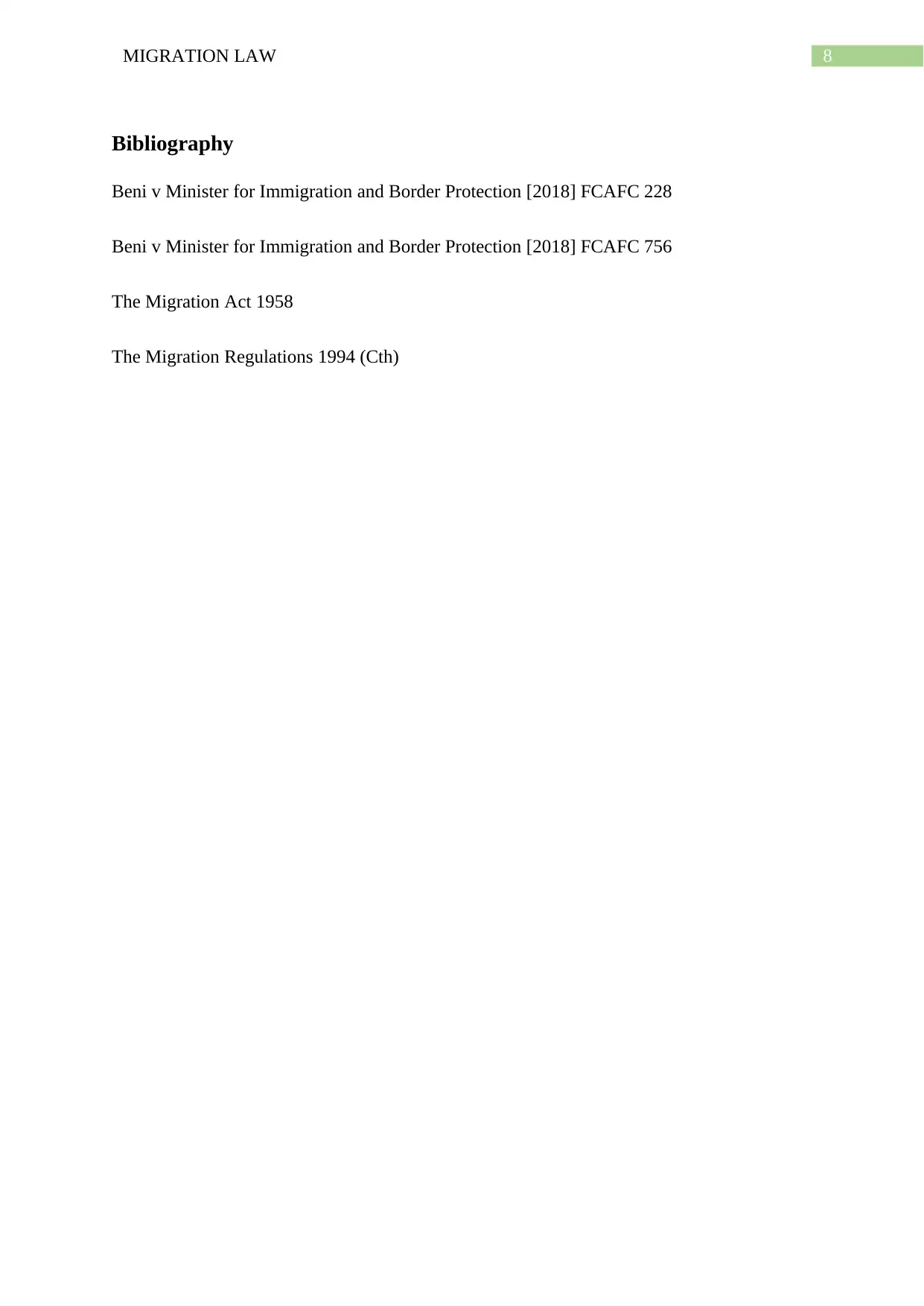
8MIGRATION LAW
Bibliography
Beni v Minister for Immigration and Border Protection [2018] FCAFC 228
Beni v Minister for Immigration and Border Protection [2018] FCAFC 756
The Migration Act 1958
The Migration Regulations 1994 (Cth)
Bibliography
Beni v Minister for Immigration and Border Protection [2018] FCAFC 228
Beni v Minister for Immigration and Border Protection [2018] FCAFC 756
The Migration Act 1958
The Migration Regulations 1994 (Cth)
⊘ This is a preview!⊘
Do you want full access?
Subscribe today to unlock all pages.

Trusted by 1+ million students worldwide
1 out of 9
Related Documents
Your All-in-One AI-Powered Toolkit for Academic Success.
+13062052269
info@desklib.com
Available 24*7 on WhatsApp / Email
![[object Object]](/_next/static/media/star-bottom.7253800d.svg)
Unlock your academic potential
Copyright © 2020–2026 A2Z Services. All Rights Reserved. Developed and managed by ZUCOL.




